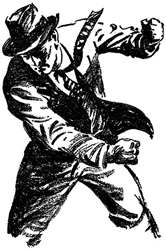

Friday sat on the marble steps leading up to Symphony Hall. Behind and above her were a dozen columns, ridged like celery stalks; the carved leafy acanthus of each column’s capital also looking celery-like in the fading light. The clock in the campanile rang six. The breeze carried a peppery scent, which made Friday sneeze.
When Friday was a child, her parents took her regularly to the monthly Thursday night concerts. They sat in their regular box, stage right. Last year, not having been to the symphony for years, decades, she called to arrange a subscription for the monthly Thursday performances, but they’d been discontinued. Not enough demand.
The cold of the stone steps seeped through her skirt into her skin.
The kiosk that sold hot chocolate when Porter Lake froze went out of business in the eighties. The heat from the cardboard cup had penetrated her wool mittens. The cocoa had burned her lips and the tip of her tongue and made a ball of fire in her throat—deliciously contrasted with her numb cheeks and freezing eyelids. Skating was discontinued a few years after.
Around the same time, the city stopped paying to keep up the maze of rose arbors in Forest Park, where she and Harry used to stroll in the summer, drenched in the perfume of roses, the vines and blossoms making complicated shadows on their faces. What was left now was a tumble-down row of rotting wood and thick, pulpy, overgrown rose stalks.
From half-a-dozen blocks away, cars whined past on the interstate: A constant bagpipe drone that, since the highway had been built in the fifties, had become the downtown’s sound track. Because of the highway, passing traffic now avoided the town. Hotels and restaurants closed. Every third or fourth bulb was burned out in the lights along Main Street—turn-of-the-century Bishop’s Crook lamps, which hung over like the Indian pipes growing in the marshes on the edge of Friday’s property, down by Snake Creek.
The cold air touched her inner thighs.
Friday squeezed her legs together.
More than half of the branch libraries had shut. The museums were opened only three days a week.
What happened?
During their last high school reunion, 90 percent of the class came in from out of town. Harry, Friday, and Rossiter were among a handful who didn’t leave after graduation.
Almost everyone else had left. To New York City. Boston. Washington. Chicago. Seattle. Austin. San Francisco.
Of course, the city would begin to die.
For Harry, none of this mattered. The main library still felt like home. The museums may have reduced their hours, but when they were open, they still were a refuge. At Symphony Hall, the few, occasional remaining concerts were a treat. In the winter, Harry enjoyed carrying a thermos of hot chocolate. He’d find half-hidden ponds, which he’d shovel clear; they’d skate in secret, private spots.
Harry would stroll through the broken-down rose arbors, thrilled by what he described as the Gothic neglect: all the park needed was a hermit in his hermitage.
The rerouted traffic on Route 91, Harry figured, protected the town from becoming part of the East Coast Megalopolis. Libraries and museum hours became, in their scarcity, more valuable. He, Friday, and Rossiter shared a bond by staying in Springdale.
Friday shivered, crossed her arms, and scrunched up her shoulders for warmth.
Harry made no effort to turn the grim into gold. The grim—the real—was magical enough. It was just how he saw things. A gift—Friday thought—he shared with those around him.
Being committed to the mental hospital—how would Harry transform that into romance?
Not hard, Friday told herself: mysteries often had a detective locked away and doped up in a sanitarium.
Friday smiled.
Yeah, she thought, even this could be part of Harry’s fantasy.
Until the drug kicked in.